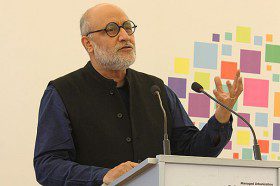The South Asia Institute was featured in a story in the Harvard Gazette, published on March 14, 2014. The story profiles SAI’s growing involvement in Pakistan, and the Contemporary South Asian City Conference in Karachi in January.
The bright side of Pakistan
By Alvin Powell, Harvard Staff Writer
The initial idea was a lecture by a noted Harvard design professor and a quiet discussion with a small group of interested local partners.
By January, however, the event had grown into a three-day conference on South Asian cities, attracting upward of 800 people, with concurrent sessions in large tents erected for the occasion in the Pakistani port city of Karachi.
In addition to a Harvard delegation of seven, the conference drew urban design professionals, government officials, and academics from across Pakistan and elsewhere in South Asia, including India and Bangladesh. Tarun Khanna, director of Harvard’s South Asia Institute, said the event grew through regional collaboration and was symbolic of a “narrative of peace” that seeks to counterbalance the history of strife in the area.
Organizers said the conference was just the initial discussion in what they hope will be an ongoing conversation about the problems and opportunities confronting cities across the region. Further, officials at Harvard’s South Asia Institute (SAI) say the conference is both part of the Institute’s growing engagement with Pakistan and a sign of the enthusiasm of Pakistani partners for further collaboration.
SAI’s engagement is multifaceted and includes conferences and training programs in Pakistan, workshops, fellowships, and Pakistani students on Harvard’s campuses, as well as webinars spanning both locations, featuring Harvard faculty in Cambridge and viewed by students at dozens of Pakistani universities.
Meena Hewett, executive director of the South Asia Institute, said the Pakistan programs are an expression of the institute’s focus on India, Pakistan, Bangladesh, Sri Lanka, Nepal, and Bhutan. Though India is the region’s largest country, it’s important, Hewett said, that the institute promote an agenda that encompasses all of South Asia.
In addition to fostering an understanding of the country itself, Pakistan has a lot to offer to the regional dialogue, Hewett said. Pakistan is the world’s sixth-most populous nation, with a long history and enormous diversity. It is struggling with many of the same issues as many of its neighbors, including urbanization, poverty, water security, public health, religious differences, and governance.
“Beyond the narrative of violence and terrorism, there is all this good development work going on,” Hewett said.

